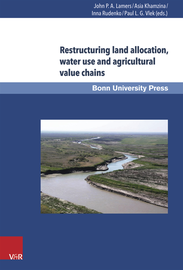Latest book: Restructuring land allocation, water use and agricultural value chains
February 04, 2015.
Restructuring land allocation, water use and agricultural value chains
Technologies, policies and practices for the lower Amudarya region
This book covers the latest research results and insights of a decade-long ZEF-led interdisciplinary research program carried out in Uzbekistan with the support of the German Federal Ministry of Education and Research (BMBF) and UNESCO. The project was started in 2001 and ran over a decade, not only producing scientific outcome but also practical and sustainable solutions as well as policy-relevant recommendations for the region’s challenges in the realm of water and land use.
We’d particularly like to point to the so-far non-published articles in this volume, tackling issues such as Farm restructuring (chapter 2.1), Virtual water along the cotton value chain (chapter 2.4), Irrigation efficiency (chapter 3.1) and management (chapter 4.4), Management of soil salinity (chapter 3.3), Water price flexibility (chapter 4.2), and Food price fluctuations (chapter 4.5). The closing chapter (6) not only comes up with conclusions but also with options for actions in regions with similar socio-economic and environmental conditions as prevalent the Khorezm region in Uzbekistan.
General information
Central Asia underwent an agricultural transformation in the 20th century that was neither efficient nor sustainable. There is a need for innovations that will remedy these deficits by reversing environmental degradation and ensuring poverty alleviation. This book provides science-based findings and recommendations for restructuring land and water use and agricultural value chains to enable ecologically and economically sound practices that increase resource use efficiency, rehabilitate ecosystem functions, and enhance rural incomes. Innovations were designed in concert with stakeholders. The prospective benefits are shown for the Khorezm region, part of the lower Amudarya region, Uzbekistan, but the findings can be extrapolated to regions facing similar agro-ecological challenges.


